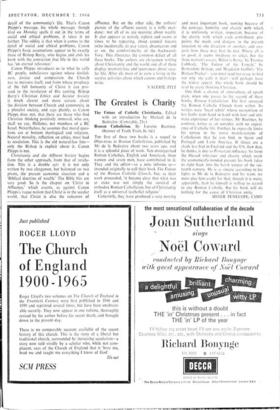The Greatest is Charity
The Future of Catholic Christianity. Edited with an introduction by Michael de la Bedoyere. (Constable, 21s.) Roman Catholicism. By Loraine Boettner. (Banner of Truth Trust, 8s. 6d.)
THE first of these two books is a sequel to Objections to Roman Catholicism, published by Mr de la Bedoyere about two years ago, and it is a splendid piece of work. Ten distinguished Roman Catholics, English and American, three women and seven men, have contributed to it. They and the editor—so a note informs us— intended originally to call their book The Future of the Roman Catholic Church, but, as their work proceeded, 'it became clear that what was at stake was not simply the survival of orthodox Roman Catholicism, but of Christianity itself as a universal (catholic) religion.'
Conjointly, they have produced a very moving and most important book, moving because of the courage, humility and charity with which it is uniformly w ritten, important because of the clarity with which each contributor pin- points the needs and dangers in the present situation in one direction or another, and sug- gests how these may best be met. Where all is so good, it seems invidious to select, but the three women's essays, 'Belief is Being.' by Yvonne Lubbock, 'The Future of the Female,' by Bernardine Bishop, and Magdalen Gollin's 'The Broken Pitcher'—you must read her essay to find out why she calls it that!—will perhaps have the widest appeal. The w hole book should be read by every thinking Christian.
One finds a change of atmosphere, of epoch even, when one passes to the second of these books, Roman Catholicism. The first surveyed the Roman Catholic Church from within. Its riters were 'loyal rebels' whose recognition of her faults went hand in hand with love and inti- mate experience of her virtues. Mr Boettner, by contrast, writes as an outsider, with no experi- ence of Catholic life. Further, he expressly limits his survey to the worst manifestations of Catholicism that he can find, in Spain and Portugal and Latin America. If things are a shade less bad in England and the US. then that, he thinks, is due to Protestant influence. So from the blessed tolerance and charity which mark the ecumenically-minded present, his book takes us right back into the harsh temper of the six- teenth century. He is as sincere according to his lights as Mr de la Bedoyere and his team; we must give him credit for that, though it is more, apparently, than he himself is willing to accord to any Roman Catholic. But his book will do nothing for the cause of Christian unity.
SISTER PENELOPE, CSMV


































 Previous page
Previous page